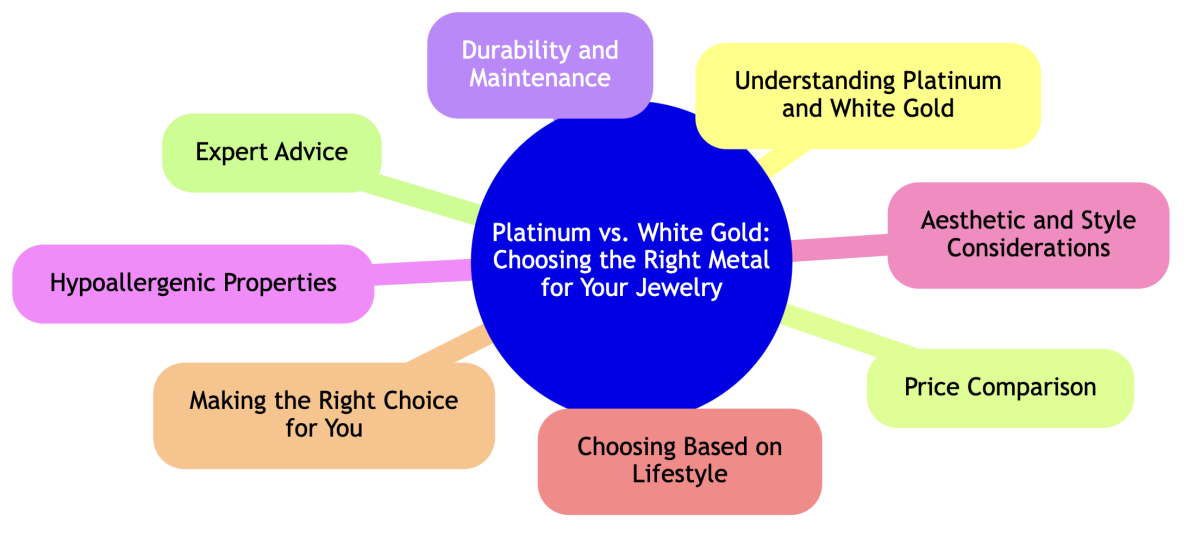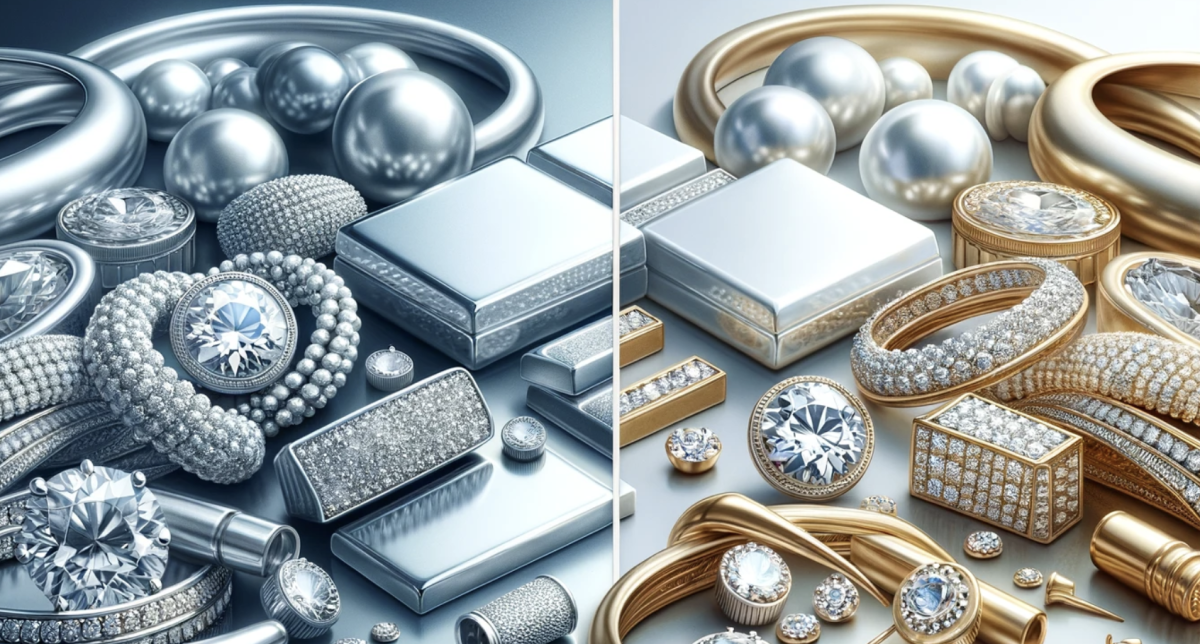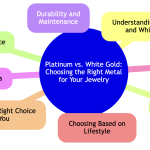Introduction: Precious Metals
When selecting jewelry, the choice of metal is as crucial as the design itself. Platinum and white gold, each with its unique allure, offer different benefits and considerations. This choice not only affects the jewelry's appearance but also its longevity, care, and how it complements your skin tone. Understanding the distinct qualities of platinum and white gold can help you make an informed decision that aligns with your style and practical needs.
- This article comes from the best Gold Buyer CO Springs has to offer, Gold Rush.
Key Takeaways
- Platinum is denser and more durable than white gold, making it ideal for long-term wear.
- White gold is more affordable upfront but requires more maintenance over time.
- Platinum's natural white luster lasts without the need for replating.
- White gold offers a similar aesthetic to platinum but at a lower cost, thanks to its rhodium plating.
- Platinum is hypoallergenic, making it a better choice for sensitive skin.

Understanding Platinum and White Gold
Platinum and white gold are two of the most popular choices for fine jewelry, each with its own set of characteristics.
Platinum, a naturally white metal, is renowned for its strength and durability. It's a heavy, dense metal that feels substantial when worn. Its natural luster and hypoallergenic properties make it a premium choice for jewelry, especially for pieces that are worn daily, like engagement rings and wedding bands.
White gold, on the other hand, is an alloy of gold mixed with white metals such as palladium or nickel, coated in rhodium to achieve its shiny white appearance.
This plating not only enhances its whiteness but also contributes to its durability. However, unlike platinum, white gold's rhodium coating may wear off over time, requiring replating to maintain its luster.
Composition and Color
The fundamental difference between platinum and white gold lies in their composition and inherent color. Platinum's purity is one of its standout features, typically consisting of 95-98% platinum with the remainder made up of other metals. This high level of purity gives platinum its natural white color that doesn't fade or tarnish over time.
White gold's appearance is achieved through a mixture of gold with white metals and a final coating of rhodium. This rhodium plating gives white gold a bright, reflective appearance similar to platinum but at a more accessible price point. However, the rhodium plating can wear away, revealing the naturally more yellow color of the gold alloy beneath, which necessitates periodic replating to restore its white finish.
The choice between platinum and white gold involves balancing considerations of cost, maintenance, and aesthetic preference. Platinum offers a naturally white, durable option that holds up well over time with minimal upkeep, while white gold provides a cost-effective alternative with a similar appearance, albeit with more maintenance required to preserve its white sheen.
Price Comparison
The cost difference between platinum and white gold is influenced by several factors, including market demand, rarity, and the materials' intrinsic value. Platinum is generally more expensive due to its higher density and rarity. It requires more of the metal to create a piece of jewelry of the same size as that of white gold. Additionally, platinum's purity means it's sold closer to its market value, whereas white gold is an alloy, which dilutes the pure gold content.
Average Price Ranges for Platinum and White Gold Jewelry
|
Metal Type |
Average Price Range |
|
Platinum |
$1,000 - $5,000 |
|
White Gold |
$500 - $2,500 |
Durability and Maintenance
Platinum stands out for its remarkable durability and heft, making it less prone to wear and tear than white gold. However, its density makes it more susceptible to scratches, although these merely displace the metal without significant loss.
- Regular Cleaning: Both metals benefit from regular cleaning to maintain their luster.
- Rhodium Replating for White Gold: To restore its white shine, white gold jewelry should be replated every 1-2 years.
- Professional Polishing: Platinum can be professionally polished to diminish the appearance of scratches.
- Avoid Chemical Exposure: Minimize exposure to harsh chemicals to prevent damage to both metals.
Hypoallergenic Properties
Platinum's hypoallergenic nature makes it a superior choice for individuals with sensitive skin. Unlike white gold, which often contains nickel and other alloys that can trigger allergic reactions, platinum's purity ensures it remains gentle on the skin, making it ideal for everyday wear without discomfort.
Aesthetic and Style Considerations
The choice between platinum and white gold significantly impacts the jewelry's appearance and style. Platinum maintains its white color indefinitely, while white gold may yellow over time and require rhodium replating to restore its whiteness.
- Color Longevity: Platinum retains its color; white gold needs maintenance to keep its shine.
- Weight and Feel: Platinum's density gives it a substantial feel, preferred by some for its quality.
- Gemstone Settings: Platinum's strength is ideal for securing precious stones; white gold is lighter and requires careful handling.
- Style Flexibility: White gold offers a modern look at a lower cost, while platinum is sought after for its prestige and durability.
Choosing Based on Lifestyle
Daily Activities
Your daily routine plays a crucial role in selecting the right metal for your jewelry. Platinum's durability makes it an excellent choice for those with active lifestyles, as it withstands wear and tear better. White gold, while durable, may require more care to maintain its appearance over time.
Exposure to Chemicals
Frequent exposure to chemicals can affect the longevity and appearance of your jewelry. Platinum is highly resistant to chemical corrosion, making it ideal for those who often come into contact with harsh substances. White gold, however, can discolor or tarnish and may need additional care or replating.
Work Environment
Consider your work environment when choosing between platinum and white gold. If you work in a field that involves physical labor or the use of chemicals, platinum's resilience makes it a safer bet. White gold might be more suitable for office settings or environments where the jewelry is less likely to face abrasion or chemical exposure.
Making the Right Choice for You
Choosing between platinum and white gold for your jewelry comes down to balancing several key factors.
Consider the initial cost and long-term maintenance, the metal's appearance and how it complements your style, and any personal sensitivities, such as allergies to certain metals.
Platinum offers unmatched durability and hypoallergenic properties but comes at a higher price point. White gold, more affordable initially, requires periodic maintenance to retain its luster. Reflect on what matters most to you in your jewelry to make the best choice.
Expert Advice
Consulting with a jewelry expert can provide invaluable insights into making the right choice between platinum and white gold.
These professionals can offer personalized advice based on your lifestyle, preferences, and budget, ensuring you select a metal that not only meets your aesthetic desires but also stands the test of time.
An expert's guidance can help navigate the nuances of each metal, from care requirements to cost implications, making your decision an informed one.
Wrapping Up - Gold Rush Has You Covered
The decision between platinum and white gold for your jewelry is significant, impacting not just the piece's beauty but its longevity and how it fits into your life. Platinum shines for its durability and hypoallergenic qualities, ideal for those seeking a low-maintenance option that lasts. White gold appeals for its affordability and similar aesthetic to platinum, though it requires more care over time. Carefully weigh the differences in cost, maintenance, appearance, and personal considerations.
Whatever your choice, ensure it aligns with your lifestyle and personal taste, bringing you joy and satisfaction every time you wear it. As you navigate this important decision, remember that Gold Rush Colorado Springs is here to guide you through every step. With our expertise and wide selection of both platinum and white gold pieces, Gold Rush ensures you find not just a piece of jewelry, but a treasure that perfectly complements your life and style.


























